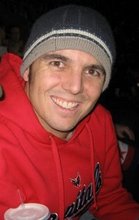
For the first time in recent memory on Wednesday morning, I woke up refreshed after a lucid and uplifting dream. I don’t know why, but I’ve had a hell of a time falling asleep lately. I quit caffeine cold-turkey awhile back, but even that hasn’t seemed to help. When I do finally hit the sack, my dreams have been straight out of an M.C. Escher painting or a Pink Floyd video. In one of my “favorites” that I really hope the TiVo in my limbic system recorded, I was kicked out of law school and forced to return to the fifth grade, where Ms. Davis promptly turned into a fire-breathing dragon that I was forced to battle with a baguette. I swear to God I had this dream. May He spare you from the same.
But Wednesday was a little different. In my dream, I had just received the good news that I had passed the Maryland Bar Exam with flying colors, and my employer invited me over to his big white house for a home-cooked meal with his family. My boss’ name was Barry; joining us were his wife, Michelle, and his two young daughters, Malia and Sasha. The bright light of the Potomac dusk shone through the bay window illuminating an oak table. A spry “goldendoodle” puppy scurried around the table demanding scraps. The puppy, I was told, was a gift that Dad had given his girls as a gift for putting up with two years of long business trips. The conversation was light and varied. Michelle and I talked about my family; the girls wanted to know if I liked the Disney Channel; Barry and I talked about the Constitution, and what he and I together could do to restore it.
I woke up with a deep breath and glanced around the bedroom. The family of four was nowhere to be found. The only friends to greet me were my alarm clock and pictures of Heather and Ryan. It had only been a dream…it was only a dream…it couldn’t have been anything more than a dream…
In the event that you were engaged in a life-and-death struggle with the Land Shark and missed the news on Tuesday night, the American people gave this guy Barry a job promotion. He is now the 44th President of the United States. And here’s the best part: Barry is black.
I’m going to let that sink in for a moment. Lather. Rinse. Repeat.
The next President of the United States will be an African-American.
I developed somewhat of a Pollyanna perspective on race relations growing up in the Wonder Bread factory of Washoe County, Nevada. In third grade music, we sang songs every January about Martin Luther King, Jr., and all the work that he and others did during the Civil Rights movement to make things better for blacks in America. And I came to believe that Dr. King’s work in fighting separate-but-equal in the South in the 1950s and 1960s was fait accompli. Dr. King had pushed racism into the American twilight, now dormant except in the hearts of a few malevolent souls on the fringe. After all, I had a handful of black friends who lived in my neighborhood, and they seemed to enjoy the same benefits of life in America that I did. Their families were like mine. They played Nintendo and they had the same problems as all of the other white kids at Lloyd Diedrichsen Elementary School. They looked, dressed, and acted just like Malia and Sasha, the two girls from my dream. I had no way of knowing that beneath the All-American identity I projected onto them, a second consciousness percolated beneath the surface, a conscious identity scarred by doubts carved by the knife of our latent historical memory.
In 1903, a 35-year-old black civil rights leader named W.E.B. Dubois penned one of the most influential works in African-American literature, The Souls of Black Folk. In it, Dubois describes how he developed what he terms the “double consciousness” that haunts young black men who suffered through slavery, Jim Crow, lynch mobs, and even subtler forms of discrimination. As a boy growing up in New England, he and a white friend went to a local store to buy candy. The friend was able to complete his transaction. He himself was declined. It was the first time in his life he had encountered such invidious and open discrimination. At that flashpoint, Dubois’s singular personal identity received a second layer, a socially imposed identity of blackness. This discrimination cast a veil over his vision, and his double identities as a human being created in God’s image and as a black man cast a lesser lot in society became inextricably entwined.
The shopkeeper had not taunted Dubois or caused him any physical harm, but the message was clear. Step back. Know your place. This is the great insult that millions of black Americans have had to endure over the course of our history. It is difficult for those of us who grew up in the comforts of post-segregation white suburbia to truly empathize with the subtler forms of discrimination that cut like a thousand tiny knives into the souls of black folk. We are often content to dwell in the bliss of our ignorance.
It wasn’t until I moved to Washington that I truly began to comprehend the social, economic, and psychological gulf that separates millions of blacks from the right to the pursuit of happinesss that the rest of us enjoy. It is not so much that they are the continuous victims of direct discrimination, but that the badges of slavery persist to this day. A slave becomes a sharecropper. The sharecropper cannot produce enough food to live, so he moves North to the city. He cannot get a job in a factory because the union bars blacks from working in a closed shop. He is denied access to equal education, and settles in the ghetto. His kids, grandkids, and great-grandkids are born, live, and die there, because they attend underfunded public schools and are not given the tools to advance, to climb the ladder, to pursue happiness. It is a vicious and unending cycle out of which few escape.
Meanwhile, across the Anacostia River, the black man’s white counterpart leaves the law firm early to catch his son’s lacrosse game. He wears not a hand-me-down painter’s uniform, but a thousand-dollar suit from Brooks Brothers. It is not the white man’s fault that the black man is suffering. It is simply the sad reality that in this, the most segregated of Northern cities, they live parallel lives that rarely meet. While the white man has been afforded the blessings of liberty, circumstances have denied the same to the black man. All of this because the black man, the great-great-great grandson of a Georgia sharecropper, is burdened with not one identity but two. He is a man, but he is also a black man. There is no longer de jure segregation, but de facto segregation is alive and well in our Nation's Capitol.
So it was that after I had jumped out of bed after my dinner with that nice new family at 1600 Pennsylvania Avenue, I threw on my running shorts, shirt, and hooded sweatshirt and jogged over to the Epicurean Deli for a quick breakfast for hitting the gym. As I sat at the bar methodically plowing through scrambled eggs and berries, I glanced up at the TV screen to catch the post-election commentary on CNN. Barry and his white friend, Joe, buried their opponents John and Sarah for the privilege of running the country. I grinned with delight; the urbane, white progressive law student, contemplating how Barry and Joe could restore the Constitution or invest in a green energy infrastructure. My brain sounded with the chatter of latte liberals sharing scones at Politics & Prose.
Behind me approached an older black woman, probably in her 70s or 80s. She wore a bandana on her head the way Harriet Tubman might have as she conducted human trains on the Underground Railroad. As she gazed at the screen, tears welled up in her eyes, clearly for the second, third, or fourth time in 24 hours.
“I watched the polls in Fairfax yesterday,” she let out. “Lord have mercy, this day has finally come.”
Her name is Ossie. She is from Macon, Georgia. She earned a degree in social work at Howard University. She had seen a lot of days, but her day – her day – had finally come.
We talked for a brief while about her thoughts about the election, its impact on young black men not unlike the young W.E.B. Dubois, and what it meant for all of us. When I told her I had done some canvassing for Barry in Virginia, she shook my hand. “God bless you, you did his work.”
At the moment I touched Ossie’s hand, I knew why I had had that dream on Tuesday night. That family I dined with – the Obamas, they are called – were not troubled by the second consciousness that seemed to have burdened our brethren. Their identities were one. As I let go of Ossie’s hand, it was as if she were relieved of her own second consciousness. She was no longer a black woman. She was a woman. An American. Barry had gone to the counter with his white friend Joe, and melted the heart of the shopkeeper. He got his candy. Ossie got her candy. We all got candy on Tuesday.
Dr. King once said that he had a dream. So did I.







